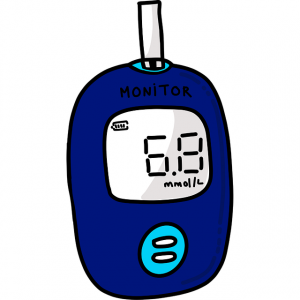Blood sugar levels. Insulin sensitivity. Risk of diabetes. What, if anything, is the likely effect of selenium supplementation on glycemic control?

Glycemic control is the maintenance of blood sugar levels within an acceptable range to prevent the adverse effects of low blood sugar and high blood sugar.
The best measure of glycemic control is the HbA1c test. This blood test HbA1C gauges the average glucose level in the blood over a period of approximately three months. It is considered a good predictor of diabetic complications.
Checking Blood Sugar
The US Center for Disease Control and Prevention suggests that logical times for testing blood sugar levels are as follows [CDC 2022]:
- When first awake and before eating or drinking anything
- Before a meal
- Two hours after a meal
- At bedtime
Target Blood Sugar Levels
The CDC suggests the following desirable blood sugar levels [CDC 2022]:
- If checked before a meal: From 80 to 130 mg/dL (= 4.4 to 7.2 mmol/L)
- If checked two hours after a meal: Less than 180 mg/dL (< 10 mmol/L)
Meta-Analysis of Selenium Supplementation and Glycemic Control Studies
Vajdi et al investigated the effects of selenium supplementation on glycemic control parameters. Their analysis of the pooled data from 20 randomized controlled trials yielded the following results:
- Selenium intake significantly reduced fasting insulin levels.
- Selenium intake significantly increased quantitative insulin sensitivity check index (QUICKI) values.
- Selenium supplementation did not change fasting blood sugar levels.
- Selenium supplementation did not change HbA1c blood test results.
- Selenium supplementation did not change HOMA-IR insulin resistance values.
Discussion: Selenium Supplementation and blood sugar Control
- Selenium supplementation confers some benefits on fasting insulin and QUICKI levels compared with placebo.
- Sub-group analysis revealed that selenium supplementation is associated with a significant decrease in fasting blood sugar levels among the following sub-groups:
- Participants who received 200 mcg or less of selenium supplementation
- Participants who had an intervention period of 12 weeks or less
- Participants who were under 50 years of age
- Participants who were men
- Participants who had diabetes, gestational diabetes, or prostate cancer
- Administration of 200 mcg or less of selenium supplementation per day reduced fasting blood sugar more effectively than administering more than 200 mcg/day.
- Sub-group analysis revealed that selenium supplementation significantly decreased HOMA-IR levels in the following circumstances:
- When the supplementation lasted at least 12 weeks
- When the participants were female
- When the participants were, under 50 years of age
- When the participants had diabetes or gestational diabetes
- Sub-group analyses did not show any effect of selenium supplementation on HbA1c test results. One explanation may be that there was an insufficient number of studies conducted longer than 12 weeks.
- Sub-group analysis suggested that selenium supplementation was most effective for diabetes and gestational diabetes patients. A previous study has indicated that diabetics may have a deficiency of selenium in comparison with non-diabetics. In addition, previous studies have indicated that selenium levels in the blood decrease during pregnancy.
Conclusions: Selenium Supplementation and blood sugar
The meta-analysis of the data from 20 randomized controlled trials showed that selenium supplementation is associated with a significant reduction in insulin level and a significant increase in insulin sensitivity.
In some sub-groups, selenium supplementation was also associated with an improvement in fasting blood sugar and with a reduction in insulin resistance.
Most importantly, the meta-analysis did not show any detrimental effects of selenium supplementation on biomarkers of a possible risk of developing diabetes.
Sources
CDC. Manage Blood Sugar. Centers for Disease Control and Prevention. 2022. Retrieved from https://www.cdc.gov/diabetes/managing/manage-blood-sugar.html.
Vajdi M, Hassanizadeh S, Gholami Z, Bagherniya M. Selenium supplementation effect on glycemic control: A GRADE-assessed systematic review and dose-response meta-analysis of randomized controlled trials. Pharmacol Res. 2023 Sep;195:106888.
The information presented in this review article is not intended as medical advice and should not be used as such.
15 October 2023
